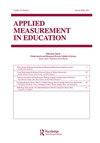应用文化响应性教学框架设计和评估夏威夷课堂绩效评估
IF 1.1
4区 教育学
Q3 EDUCATION & EDUCATIONAL RESEARCH
引用次数: 0
摘要
以前的文章集中在为什么围绕学生的文化、社会和/或语言多样性进行评估设计是重要的,以及基于绩效的评估如何支持这些目标。本文通过描述如何从文化响应性教育(CRE)教学框架中创建文化响应性课堂评估框架来扩展先前的工作。该框架的目标是指导嵌入课程的课堂表现评估的设计和评估。讨论的内容包括:修改以证据为中心的设计过程,教师和/或学生适应构建任务提示的不相关方面,增加文化意义问题以大声思考,以及修改任务质量审查协议以促进CRE设计特征。未来的研究需要探索所应用的框架的局限性,以及学生认为课堂总结性评估设计的程度确实允许他们更好地展示他们所知道的和可以做的与他们的文化,社会和/或语言身份相关的方式。本文章由计算机程序翻译,如有差异,请以英文原文为准。
Applying a Culturally Responsive Pedagogical Framework to Design and Evaluate Classroom Performance-Based Assessments in Hawai‘i
ABSTRACT Previous writings focus on why centering assessment design around students’ cultural, social, and/or linguistic diversity is important and how performance-based assessment can support such aims. This article extends previous work by describing how a culturally responsive classroom assessment framework was created from a culturally responsive education (CRE) pedagogical framework. The goal of the framework was to guide the design and evaluation of curriculum-embedded, classroom performance assessments. Components discussed include: modification of evidence-centered design processes, teacher and/or student adaptation of construct irrelevant aspects of task prompts, addition of cultural meaningfulness questions to think alouds, and revision of task quality review protocols to promote CRE design features. Future research is needed to explore the limitations of the framework applied, and the extent to which students perceive the classroom summative assessments designed do indeed allow them to better show all they know and can do in ways related to their cultural, social, and/or linguistic identities.
求助全文
通过发布文献求助,成功后即可免费获取论文全文。
去求助
来源期刊

Applied Measurement in Education
Multiple-
CiteScore
2.50
自引率
13.30%
发文量
14
期刊介绍:
Because interaction between the domains of research and application is critical to the evaluation and improvement of new educational measurement practices, Applied Measurement in Education" prime objective is to improve communication between academicians and practitioners. To help bridge the gap between theory and practice, articles in this journal describe original research studies, innovative strategies for solving educational measurement problems, and integrative reviews of current approaches to contemporary measurement issues. Peer Review Policy: All review papers in this journal have undergone editorial screening and peer review.
 求助内容:
求助内容: 应助结果提醒方式:
应助结果提醒方式:


